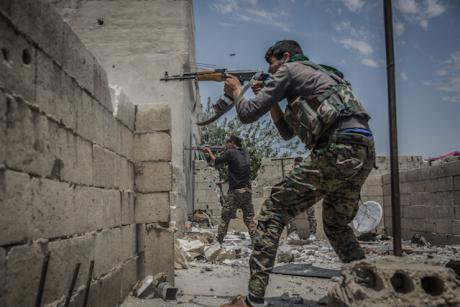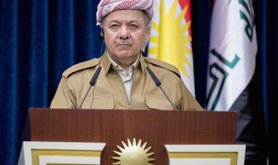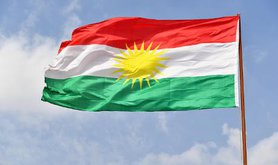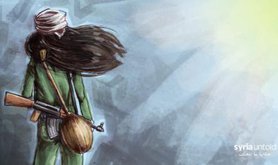
U.S.-backed mainly-Kurdish militia (YPG) firing on IS militant positions in Al Sinaa neighborhood, eastern Raqqa, Syria, 06 July 2017. Morukc Umnaber/Press Association. All rights reserved.The situation of the Kurds in a drastically changing Middle East has received little attention in academia and less in the media despite their growing impact on regional and international politics. The biggest stateless people living in the Middle East are on the verge of a new status, not only in Iraqi Kurdistan, where a referendum for independence takes place on September 25, 2017, but also in Syria and Turkey. In Syria, Kurds have fought an organised and effective struggle against the IS. In Turkey, they have suffered a massive destruction of Kurdish cities, displacement of half a million Kurds and eradication of all forms of legal entity by the Turkish state. Then there is Iran. This week’s short series looks at current political struggles of the Kurds in four neighbouring countries. Mehmet Kurt, series editor.
With the fall of the Ottoman Empire in the aftermath of the First World War, the Kurdish question – the denial of the Kurds’ right to form their own nation-state and the division of their land among four countries of Syria, Turkey, Iraq and Iran – became one of the major geopolitical questions in the Middle East.
Throughout the last century, the Kurdish peoples’ right to self-determination has been expressed in various forms of struggle in movements such as the Republic of Kurdistan in 1946, the rebellion of Iraqi Kurds in 1960s and 1970s, the armed struggle of the Kurdistan’s Workers Party (PKK) in Turkey since the 1980s and the Rojava revolution in Syria. Notwithstanding ideological and political differences among these movements, they have relied, to varying degrees, upon foreign support in their fights for self-determination.
The current military collaboration between the self-identified revolutionary leftists in Rojava (Syrian Kurdistan) and the United States in their combat against the Islamic State is a case in point and perhaps the most staggering example. This recent alliance has deeply bewildered many progressives (the Anglo-Saxon left in particular) to the point that they have either discredited the Rojava revolution or taken a hostile position towards it. What has not been discussed critically, however, is the historical and structural reasons that would leave a revolutionary movement with no option but to ask for help from virtually whoever offers it. The current military collaboration between Rojava and the United States… is a case in point and perhaps the most staggering example.
In what follows, I will focus on the case of Syrian Kurds. A closer look at the case of Rojava will be helpful for gaining a more grounded understanding of why many Kurdish movements and political parties, rightwing or leftwing, seek support from regional and global powers that have historically played a direct or indirect role in oppressing the Kurds.
Autonomy rather than national liberation
There is little contention about the role of western colonial powers in the creation of the Kurdish question. However, political analysts have paid scant attention to the main actors in perpetuating the Kurdish question. The current national borders of the Middle East within which the Kurds aspire to consolidate their self-rule are a legacy of imperialist interventions of western colonial powers during and after WWI. Yet, for the most part, regional powers and their ethnicized nationalisms have maintained the political, cultural and economic oppression of the Kurds in the region.
After the independence of Syria in 1946, the Syrian state gradually built a chauvinist/racist regime (i.e. an overarching societal and political configuration hailed by and centred on the dominant Arab nation) that systematically rendered Kurds second-citizens and non-citizens. In fact, years prior to the 2011 popular uprisings, the Syrian regime subjected the Kurdish population to multilayered forms of violence from assimilation and denial of cultural identity to mass displacements and political oppression.
To have a sense of the extent and depth of racism and discrimination against the Kurds in Syria, it suffices to note the situation of stateless Syrian-born Kurds in the country. However, it would be naïve to think that anti-Kurdish racism only exists at the level of state. The Syrian opposition to the Assad regime is also greatly plagued by anti-Kurd racism. This is most evident in the reluctance of a vast majority of the opposition groups to recognize the Kurdish identity and the deep-rooted pan-Arabism in Syria evident in the refusal to drop the word ‘Arab’ from the title of the supposedly post-Assad state.
Given the pervasive chauvinist/racist nature of the Syrian nation-state, the Syrian Kurds have been unable to seriously consider an ally within that country. Their Kurdish sisters and brothers in Turkey, Iran and Iraq have also rarely been there for them. And there is a reason for that: the geographical fragmentation of the Kurdish nation.
The division of land and population, which gives a very unique character to the Kurdish question, has greatly inhibited the formation of a united Kurdish political front against their enemies, generally pushing Kurdish movements to seek autonomy rather than national liberation. A situation that has made Kurdish movements more vulnerable to the onslaughts of the respective nation-states within which they have been operating. The critical and desperate situation of weak nations in taking on strong nations and/or states is enough reason for such nations to ask for help from outside. There is little doubt, for example, that it would have been very unlikely for Cuba to survive decades after the 1959 revolution had there not been all sorts of support from the former Soviet Union. There is little doubt that it would have been very unlikely for Cuba to survive decades after the 1959 revolution had there not been all sorts of support from the former Soviet Union.
With the Kurds, the situation is even more complicated and hopeless as the fragmentation of their land and struggle has neither allowed them to pull their resources and strengths together, nor have they ever had such a powerful and strategic ally such as the former Soviet Union.
Anti-imperialism in the international left
Another interesting fact about the Kurdish people of Syria is that while at times Iran, Syria, Iraq, and Turkey have all used Kurdish movements as a political tool to weaken one another by providing the Kurds with political and military support, the Syrian Kurds have never received even this superficial and transitory backing. To make things even more complicated, we should recall how in the 1970s and 1980s, the Syrian state backed the PKK in their fight against the Turkish state at the same time that it repressed its own Kurdish minority. Moreover, since the establishment of democratic autonomy in Rojava, Syrian Kurds have been under constant threats posed by unholy alliances of authoritarian regional powers that, despite their differences and power rivalries, have historically made every effort to prevent the Kurds from realizing their aspiration of self-rule.
The recent announcement of the anti-Kurdish collaboration of Turkey and Iran, pursuing different plans in Syria by backing opposing sides, is only the latest example of this kind.
With no regional ally to turn to, one would have hoped that progressive groups around the world, particularly the international left, would be keen on standing in solidarity with the Kurds in Syria. On the contrary, on top of all the support that the Syrian state has historically received from major global and regional powers, it has also enjoyed the support and sympathy of a large group of anti-imperialists, in particular the Anglo-Saxon left. Some intermittent tensions with Israel earned the Syrian state the status of an anti-imperialist state. Some intermittent tensions with Israel earned the Syrian state the status of an anti-imperialist state.
Yet, historical facts demonstrate that the Syrian state’s anti-imperialist rhetoric is a myth, and many Syrian leftists have strongly challenged this naïve interpretation of anti-imperialism. The immediate outcome of taken-for-granted anti-imperialism of the Syrian state for the Syrian Kurds has been the erasure of their suffering by many on the left. This historical erasure is in total contrast to the situation of Palestine or South Africa, where the (western) settler-colonial oppressions of Palestinians and Africans have become a rallying call on and for the western left. One has to pause here and question the conception of colonization and oppression in left analyses. Has the erasure of the reality of colonialization and oppression of the Kurds in the Middle East meant that peripheral states and Third-World nationalist forces are incapable of colonial/imperial oppression?
The Kurdish question often does not draw the attention of the radical left simply because it is not a typical case of colonization/foreign intervention where a western imperialist country is directly involved. Even worse, for some, the very confrontation of the Kurds with the Third World states reinforces the idea that the Kurdish question is itself a product of western imperialism, to sabotage the stability of the so-called anti-imperialist states in the Middle East. No wonder then that the violent suppression of the Kurdish movement in Iran in the years after the 1979 revolution, as well as the massacre of Iraqi Kurds in the 1980s by Saddam Hussein never bothered the ethics and politics of the international left community in same way as the apartheid regime in South Africa and the Zionist state in Palestine did.
Even in 1991, Edward Said, the prominent left-leaning Arab scholar, expressed doubt about the violent reality of the 1988 chemical bombing of the Kurdish city of Halabja by the Iraqi state. Such denials of reality resulting from a naïve understanding of imperialism and anti-imperialism have indeed facilitated the violent destruction of the lives and lands of Kurdish populations in the region. No wonder then that the desperate Kurdish movements would consider virtually any options to protect their communities.
A matter of necessity
It is thus imperative to remember that the current strategic alliance of the Syrian Kurds with the United States has not been a matter of choice but necessity. The division of Kurdistan among four separate nation-states have made the Syrian Kurds a minority in their own homeland and geographically detached from other Kurdish populations in the region.
The Syrian State has exploited the Kurdish minority status over many decades to deny civil and political protection and rights afforded to other Syrians. In order to assert these rights, and their right to self-determination, Syrian Kurds have had to use the recent disintegration of the Syrian state to their advantage. Partly, this has meant taking advantage of regional and global power rivalries to further their own cause.
They have also had to accept help from whomever is willing to offer it, including the United States, in order to survive the recent Syrian proxy war since: 1) few nations or movements have offered financial and military support to the Kurds, and, 2) the Syrian Kurds are currently surrounded by pro-Assad forces and opposition rebels (including ISIS), both of which would oppress the Kurdish peoples of Syria if given the chance. A mere condemnation and critique of the Kurdish peoples of Syria by the western left will not get us anywhere.
My aim in contextualizing the complex situation of Kurdish struggles and their desperate search for allies should not be interpreted as total support for any strategic alliance with foreign forces. Rather my point is that a mere condemnation and critique of the Kurdish peoples of Syria by the western left will not get us anywhere. In fact, historically, tactical alliances with forces that have been politically hostile to Kurdish self-rule have most often resulted in tragedy for the Kurds. One can think of the Republic of Kurdistan in 1946 as well as the betrayal of Iraqi Kurds by the Iranian and American states in the 1970s.
In the current conjuncture of the Middle East, with intensified geo-political rivalries and war, the more strategic way of making alliances should be focused on building close ties with other oppressed nations and social groups in and beyond the region, combined with taking serious account of the physical and political survival of racialized and historically oppressed peoples.
Read more
Get our weekly email



Comments
We encourage anyone to comment, please consult the oD commenting guidelines if you have any questions.